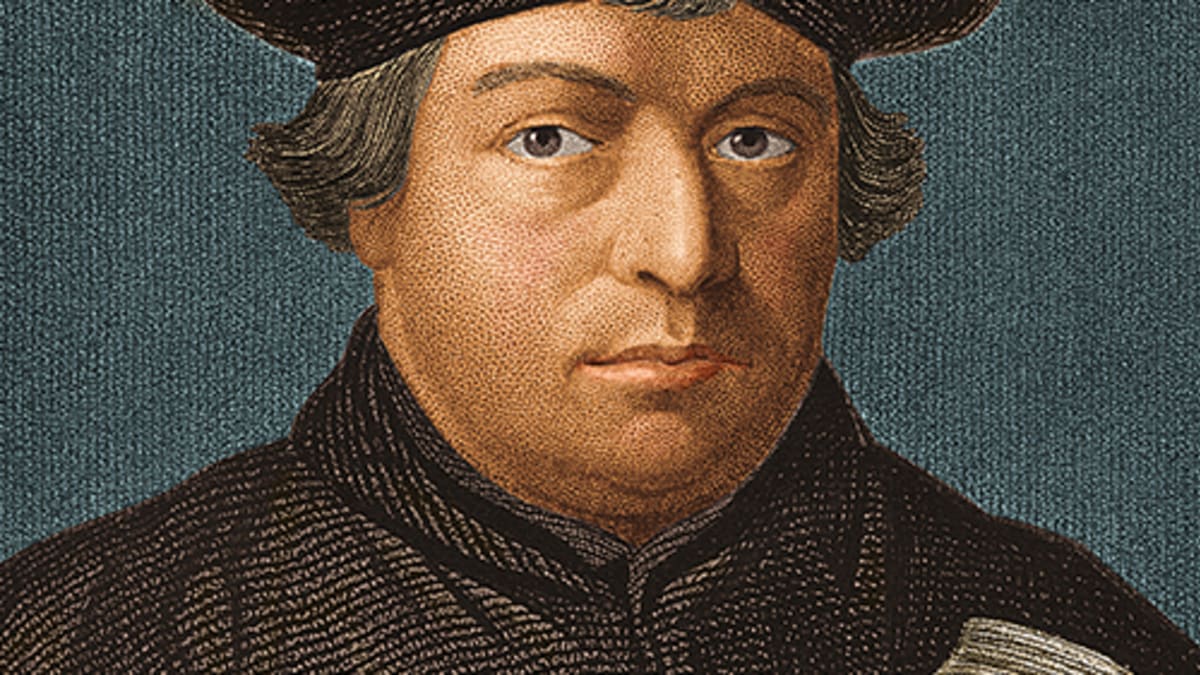Martin Luther (1483-1546) was a professor of theology the University of Wittenberg. In 1517 he was undergoing a great religious awakening. Luther’s father had sent him to the University of Erfurt, then the most prestigious in Germany, to study law. Luther yearned instead to enter the religious life. On his way back to Erfurt he was terrified by a severe thunderstorm and vowed that he would become a monk. Against his father’s opposition, Luther joined the Augustinian friars.
After ordination, however, Luther underwent a prolonged and intense personal crisis. He was convinced that he was lost—literally lost. Nothing could free him of the gnawing feeling that he could not attain God’s grace and was destined for hell. Finally a confessor advised the desperate young man to study the Bible and to become a teacher of Scripture. Through his reading in the Epistles of Paul and the writings of Augustine, Luther gradually found an answer to his anxiety: that he should have faith in God and in the possibility of his own salvation.
Fortified by his intense conviction of the importance of faith, Luther questioned Catholic practices that in his view were abuses. He cast his questions in the form of his Ninety-five Theses. The specific abuse that the theses sought to prove un-Christian was the “sale” of indulgences, in particular the activities of a Dominican, Johann Tetzel (c. 1465-1519), who was conducting a “drive” for voluntary contributions to rebuild St. Peter’s in Rome. One of the German ecclesiastical princes also had a stake in the indulgences; this was Albert, brother of the elector of Brandenburg, who had paid a very large sum to the papacy for a dispensation permitting him to grant indulgences.
“Indulgences” made possible the remission of temporal punishment for sins. Only God can forgive a sin, but repentant sinners also must undergo punishment on earth in the form of penance and after death in purgatory, where they atone by temporary punishment and are prepared for heaven. Indulgences could not assure the forgiveness of sins, but they could remit penance and part or all of the punishment in purgatory. The church claimed the sole authority to grant such remission by drawing on the Treasury of Merit— a kind of storehouse of surplus good works accumulated by the holy activities of Christ, the Virgin, and the saints.
The use of the word sale in connection with indulgences became a form of Protestant propaganda. The Catholics insisted that an indulgence was not “sold,” that it was “granted” by the priest and any monetary contribution made by the recipient was a freewill offering. However, the highly successful Tetzel had virtually advertised indulgences with a slogan. “As soon as coin in coffer rings, the soul from purgatory springs.” The doctrine of indulgences was too complex for the ordinary person to grasp completely, and it must have looked as though a sinner could obtain forgiveness of sin as well as remission of punishment if only one secured enough indulgences.
At the theological level Luther’s quarrel with his ecclesiastical superiors was over one of the oldest and most abiding tensions of Christian thought: the tension between faith and good works. Faith is an inward and emotional belief, and good works are the outward demonstration of that belief as expressed by a person’s good deeds, partaking of the sacraments, and submitting to the discipline of penance. Indulgences held out the promise that one might secure extra good works by drawing on those stored up in the Treasury of Merit. While Christian practice usually insisted on the need for both faith and works, in times of crisis one extreme or the other was emphasized.
In response to Luther’s theses, the papacy stiffened its resistance, which in turn drove the Lutherans to further resistance. Moreover, Luther was driven to minimize the importance of works and even to deny their validity altogether. Under pressure of combat, Luther declared that people were saved by faith alone. He went on to deny that priests were necessary intercessors and to affirm the priesthood of all true believers: “every man his own priest.”
The Roman church was quickly alerted to the importance of the issues that Luther had raised. Tetzel had aroused such indignation that he dared not appear in public, and the archbishop of Mainz complained to the pope of the disastrous financial implications. Pope Leo X (r. 1513-1521) had to recognize the gravity of the storm over the Ninety-five Theses. Accordingly, in 1518 at Augsburg, Luther was summoned before the papal legate and general of the Dominican order and was directed to recant some of his propositions on indulgences.
Luther would not. In 1519 at Leipzig, a learned theologian, John Eck, charged Luther in debate with disobeying the authoritative findings of popes and church councils. Luther denied that popes and councils were necessarily authoritative and, carrying his revolt further, explicitly declared his adherence to some of Jan Hus’s teachings that had been declared heretical by the Council of Constance a century earlier.
The complete break between the rebel and the church was now at hand. Late in 1520 a papal bull condemned Luther’s teachings; Luther burned the bull. In January 1521, he was excommunicated. In April 1521, after a dramatic session of the imperial Diet at Worms, the emperor Charles V placed him under the ban of the empire, which made him an outlaw.
The empire and the papacy took their drastic actions in vain. Luther was already gathering a substantial following. He had the protection of the elector Frederick the Wise of Saxony (r. 1493-1525) and was soon to secure the backing of other princes. Frederick arranged to “kidnap” the outlaw on his way back from Worms, and Luther vanished into seclusion at the castle of the Wartburg, where he began work on his translation of the Bible into vigorous and effective German. In the next year Luther, now a national hero, returned to Wittenberg to begin reshaping the church in Saxon.

